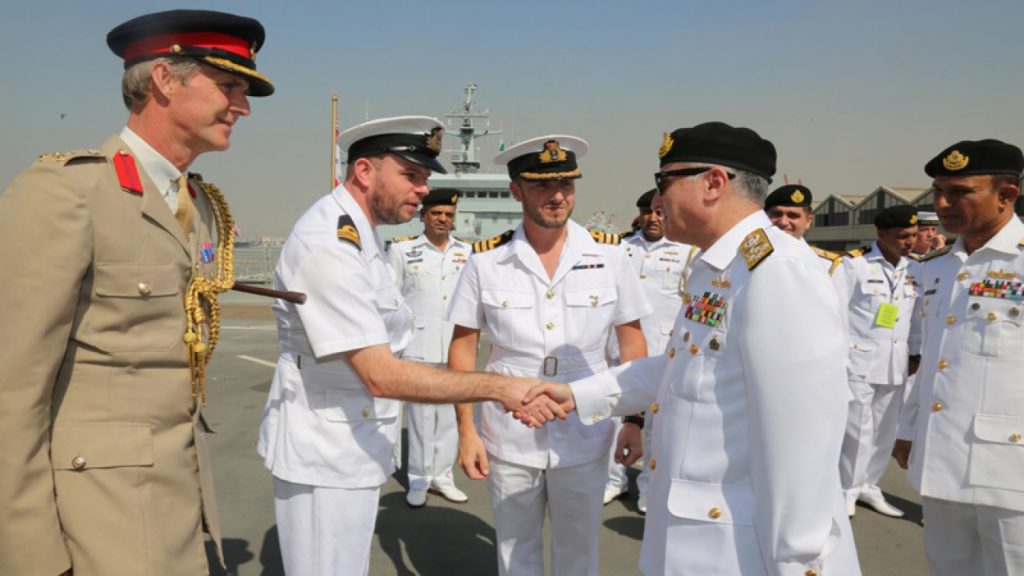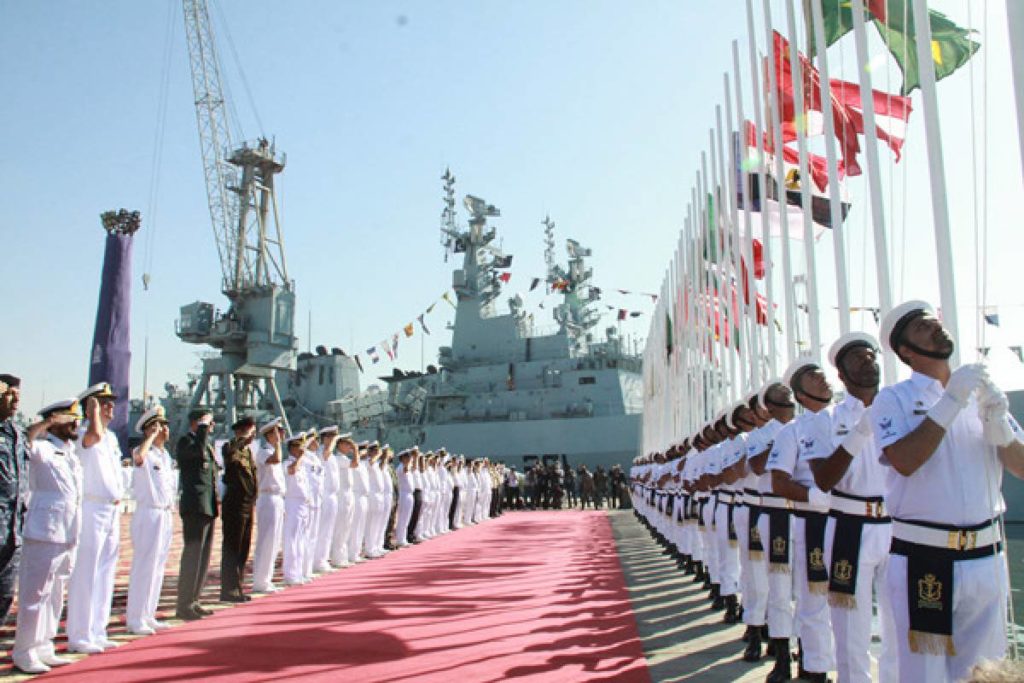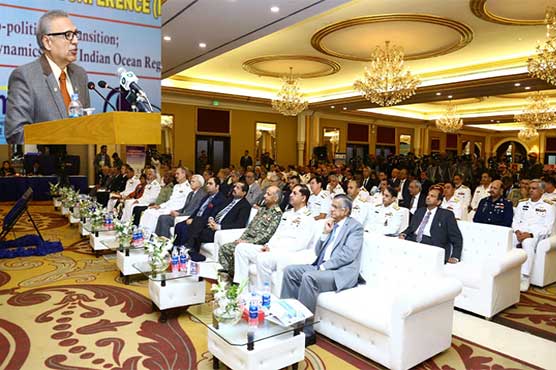Aman 2019 was the 6th exercise of a multinational naval initiative hosted biennially by Pakistan Navy since 2007. Twenty-eight countries had participated in the first Aman exercise in 2007; the number rose to 46 in Aman-2019 which radiated a strong message to Indian Prime Minster Narendra Modi, who has been dreaming of isolating Pakistan internationally and has been playing jokers through comics of so called “surgical strikes”.
Threats to maritime security increasingly emanate from contemporary asymmetric challenges that have deeply impacted the maritime environment. There is strong realization that given the vast expanse of oceans and an array of maritime threats, preserving maritime order in the global commons necessitates collaborative efforts.
The concept of Aman revolves around information sharing, mutual understanding and identifying areas of common interests for participating navies with emphasis on maritime security operations, counter terrorism operations and humanitarian assistance operation. Based on this these exercises seek to develop and practice Response Tactics, Techniques, and Procedures (RTTP) for maritime infrastructure, assets and forces employment against traditional and non-traditional threats.
The broader concept of the exercise is designed to: Provide common forum for information sharing, mutual understanding and identifying areas of common interests; develop and practice response tactics, techniques and procedures against asymmetric and traditional threats during sea phase of the exercise; and Intermingling of multinationals with depiction of their respective cultures.
The objectives of this series are: Display of united resolve against terrorism and crimes in the maritime domain; contributing towards regional peace and stability; enhancing interoperability between regional and extra regional navies thereby acting as a bridge between the regions. The objectives of 2019 exercise also included projecting a positive image of Pakistan as a country contributing towards regional peace and stability, consolidating Pakistan Navy’s position in the regional maritime arena, enhancing interoperability with regional and extra regional navies and displaying of united resolve against maritime terrorism and piracy.
The exercise provided participating countries the chance to foster friendships, which could lead them to develop and practice common tactics, procedures and mechanics to deal with the maritime threats that affected them all. Overall, it is about bridging gaps and making it possible to operate together in pursuance of shared objectives. It reinforced the confidence of other countries in Pakistan and the Pakistan Navy.
Alongside came the good news of Pakistan Navy acquiring a Chinese aircraft career. This acquisition was long overdue to correct the balance of power in our immediate and adjoining sea, gulfs and oceans. There is dire need for strategic cooperation to counter transnational maritime threats and encourage safety, security and stability in the region.
Like any maritime nation, Pakistan has substantial stakes in the maritime domain. Pakistan’s marine territory, including continental shelf, is bigger than any of the country’s provinces but the country has not yet used any of the resources in these waters. The shelf area is very rich with plenty of resources for which a China Geological Survey ship is surveying; it will take the samples for testing in Chinese labs for ascertaining exact locations and quantum of mineral resources.
Pakistan’s interest in safer and crime-free seas is rooted into three conspicuous realities: Our extraordinary dependence on the seas for trade; Operationalization of CPEC project; and our strategic location astride the global energy highway. Cumulatively, these realities make the maritime stability as the top agenda of our national security. Pakistan considers that maritime security isn’t just important for itself but for all other countries whose prosperity and progress are strongly bonded with the seas.

The Aman series exercises are based on Pakistan Navy led concept to bring leading World navies under one umbrella for collaborative peace and security in the maritime domain. At the global level, there is strong realization that given the vast expanse of oceans and an array of maritime threats, preserving maritime order in the global commons, necessitates collaborative efforts as a matter of compulsion rather than choice. Hence, maritime security ought to be prototypically cooperative instead of being competitive.
Contemporary, threats to maritime security increasingly emanate from evolving asymmetric challenges that have deeply impacted the maritime environment. Maritime security is pivotal for a typical national security and protection of maritime routes is also necessary for sustenance of economy at national, regional and global levels. Pakistan, located at a strategic position in the Indian Ocean, needs to prepare itself for the challenges, and work out viable strategy for the development of the maritime sector. Indian Ocean acts as a strategic gateway for food, maritime transportation and energy supplies to the world and the presence of major powers in the Indian Ocean Region signifies its importance under a complex security environment.
Aman-2019 was mostly a non-firing exercise as live weapon firing was only carried out in a marked area known to all ships. The exercise was conducted in two phases. Harbour phase spanned from February 08 to10; followed by the sea phase on Feb 11-12. Pakistan Air Force and Pakistan Army also took part in the exercise.
The principal purpose of the Aman series is to provide a forum for understanding of each other’s maritime concepts and operational cultures and come up with ways and means to combat common threats at sea. Aman-2019 aimed at bridging gaps and making it possible to operate together in pursuance of shared objectives. This exercise sought to enhance cooperation between countries and allows them to take benefit from mutual advantages.
The 6th Aman Exercise was an embodiment of Pakistan’s commitment toward global peace and harmony where the naval forces from across the continents were brought on a single platform to enhance combating capabilities in the wake of traditional and non-traditional security challenges. Exercise demonstrated that participating counties could work together, keeping their political differences aside, to defeat common adversaries. These adversaries pose threats like piracy, terrorism, drug-trafficking, gun-running and human smuggling; and another greater adversary is the climate change which calls for a growing need to respond to it collectively.
Demonstration of collective resolve for peace by 46 countries was the hallmark of the exercise. Naval assets including naval ships, helicopters, Special Forces elements and observers from these countries participated in the exercise. AMAN-19 will pave the way to make the region more peaceful and secure with combined efforts by all stakeholders.
The Exercise was conducted in two phases; the harbour phase spanned from 08-10 Feb and the sea phase from 11-12 Feb. The harbour phase comprised International Maritime Conference, seminars, table talks, cross ships visits, calls on, International Band Display, Maritime Counter Terrorism Demonstration, Cultural show and Food Gala. The sea phase included practical execution of operational plans and activities finalized during harbour phase.
Pakistan Navy has an international role as global partner for peace endeavours, as country’s geo-political location devolves on it special responsibility for maintaining a peaceful world. And exploitation of Blue economy and effective use of ocean resources is key to Pakistan’s prosperity. Pakistan Navy’s collaborative maritime security engagements with regional and extra-regional navies in the form of Aman-19 signifies Pakistan’s resolve and commitment towards global peace and prosperity.

Pakistan as an important regional player wishes to work in harmony and collaboration with all regional countries for the common objectives of peace, stability and economic prosperity for the people. Pakistan has always been an ardent supporter of maritime cooperation, and being the pioneer partner of Combined Maritime Forces task forces CTF-150 and CTF-151, Pakistan has been the largest regional contributor to these constructs in terms of men and material. Pakistan has commenced Regional Maritime Security Patrols (RMSP) which aims at maintaining security posture in critical sea areas and choke points in the Indian Ocean.
Pakistan has been a proactive member of maritime security initiatives launched as part of the war against terror. Pakistan Navy has always been a consistent Security contributor in Indian Ocean Region. Task Force 88 and RMSP have been institutionalized to ensure maritime security of Gwadar and adjacent sea lanes and maintain robust security posture in critical sea areas and choke points in Indian Ocean for protection of national and international shipping. Pakistan Navy has remained an active contributor in multinational coalition efforts and conduct of Aman series of Exercise is a quantum leap in this direction.
The Arabian Sea is a busy traffic route for ships and the port of Gwadar has assumed a special importance due to its strategic location. Ensuring security in Gwadar and its surrounding sea areas is solely the responsibility of the Pakistan Navy. For this, Pakistan has instituted Task Force-88, and under its umbrella, aircraft, helicopters, ships, small vessels and craft show Pakistan Navy’s presence there and provide requisite confidence to the merchant ships that come here for trade, so that they remain free of worry about piracy, smugglers or any other threat such as maritime terrorism.
Vastness of the seas presents a “complex duality”, i.e., seas provide the means to keep the world’s economy in motion whilst also affording plenty of opportunities to disruptive elements to derail progress and stability. Violent non-state actors threats in the maritime domain cannot be negotiated by a single country alone.
Pakistan as an important regional player wishes to work in harmony and collaboration with all regional countries for the common objectives of peace, stability and economic prosperity for the people of the region. Despite having a recent turbulent phase of its contemporary history, Pakistan remained steadfast in fighting the forces of terror and tyranny. Pakistan continues to be a responsible state, cognizant of its role and significance in the international system.




